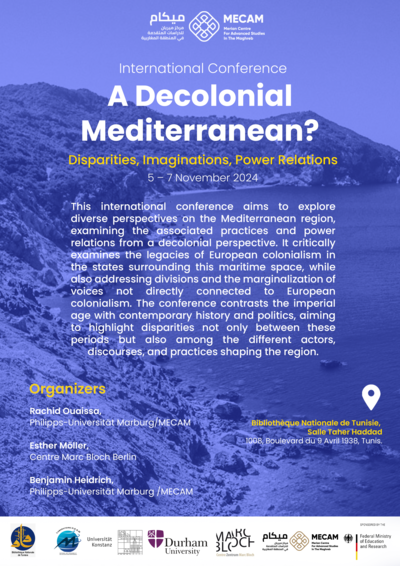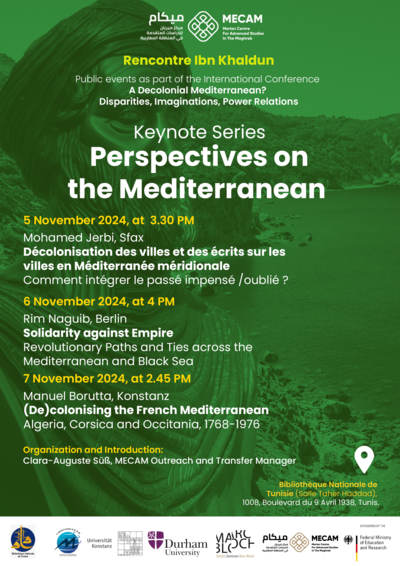A Decolonial Mediterranean? - International Conference 5-7 November 2024 - Tunis
November 05
International Conference
A Decolonial Mediterranean? Disparities, Imaginations, Power Relations
5-7 November 2024 / Tunis, Tunisia
Location
The MECAM International Conference, titled "A Decolonial Mediterranean? Disparities, Imaginations, Power Relations," will take place at the National Library of Tunisia (1008, Boulevard du 9 Avril 1938, Tunis).
Abstract
Is the Mediterranean a dead concept - or does it still have potential for dialogue among equal partners, as Mohammad Arkoun argued. The international conference "A Decolonial Mediterranean? Disparities, Imaginations, Power Relations" invites scholars in the humanities and social sciences from the north, south, east or west of the Mediterranean to explore the question of a decolonial Mediterranean from the viewpoint of Tunis and the Maghreb, and through the five interrelated ‘Interdisciplinary Research Fields’ that constitute the research agenda of the Merian Centre for Advanced Studies in the Maghreb (MECAM): Aesthetics & Cultural Practice, Inequality & Mobility, Memory & Justice, Resources & Sustainability, and Identities & Beliefs. Following Walter Mignolo and others, decoloniality is understood as anepistemological project of “undoing and redoing”. We therefore would like to discuss the colonial conditions and legacies of the western-European invention and intervention of and in the Mediterranean in relation to alternative de- and postcolonial imaginations, practices and relations of a Mediterranean region, space or concept.The Mediterranean region as a natural and cultural entity is an “imagined geography” (Edward Said) and in particular a western-European invention that contributed to the colonisation of the Maghreb, and other regions of the world, to the dissolution of the Ottoman Empire and other dynasties or states. Since the age of decolonisation after World War II, the regions in the south or east of the Mediterranean have been increasingly influenced by processes, ideas, and stakeholders from other (non-Western-European) regions, such as the USA and the USSR, or the postcolonial Arab, African or Asian states and movements during the period of the Cold War, and more recently by states like China, Russia, the Gulf states or Turkey. Geopolitical considerations will be addressed and linked to questions of representations,mobilities,
connectivities, and disparities of and in the Mediterranean that emerged in colonial, postcolonial or recent times. The conference will contrast the imperial age (1800-1950) and contemporary history and politics in order to address the relations and disparities between time periods and spatial imaginations, but also between different actors and their discourses and practices. By “decolonizing the Mediterranean” (Proglio 2017), the conference aims at critically investigating the legacies of European colonialism in the subsequent states around this maritime space and at addressing different or complementary representations of the Mediterranean within the Maghreb or other regions of the world, such as the interconnections between “White”, “Red” and “Black” Sea, put forward by intellectuals and politicians of the Ottoman Empire, or other spatial imaginations, historical legacies, ideas and practices, that order, divide and connect space, time or societies such as the desert, the rivers, the languages, or cultural and aesthetic practices.
Overall organization & coordination on site:
Benjamin Heidrich (Marburg University) : benjamin.heidrich@uni-marburg.de
Esther Möller (CMB)
and Rachid Ouaissa (MECAM, Marburg University)
Contact:
Esther Möller
esther.moeller ( at ) cmb.hu-berlin.de

